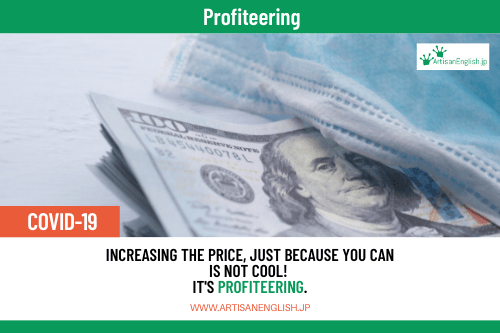
(Photo: Andreas Breitling/Pixabay | Text: David/ArtisanEnglish.jp)
YouTube / iTunes / Spotify / Radio Public / Pocket Casts / Google Podcasts / Breaker / Overcast
Listen to ArtisanEnglish.jp posts & lesson intros here.
WotD: Profiteering
Estimated reading time: 3 minutes
The base of today’s word, profiteer, can be used as a noun or a verb.
As a noun, it refers to a person who takes advantage of a situation in which people are suffering to raise prices excessively on necessary goods and make an unfair profit.
Don’t get me wrong, earning a profit is a good thing.
We live in a capitalist society, and profit makes the economy spin.
Profiteering (verb), on the other hand, is making excessive profits from people who are in a bad situation and perhaps making their situation even worse.
Some would say it’s immoral, but I prefer to think of it as evil.
When COVID first struck here in Japan, there was a nationwide mask shortage, which caused profiteering to increase.
We all heard about the box of 50 masks for ¥10,000 or other exorbitant prices online.
At that time, the Japanese government decided to intervene.
They made it illegal to price-gouge desperate people when all they wanted was a surgical mask.
The United States, however, as it often does, took a laissez-faire attitude toward the situation.
Unless it was a blatant attempt at price-fixing, it was simply considered a matter of supply and demand.
When demand is high, prices go up and vice versa.
What do you think about that?
Some Americans purchased huge supplies of hand sanitizer and masks only to jack up the price and profiteer.
That’s one of the most significant differences between the US and other Western countries.
In America, the market rules and what is seen as profiteering in Japan, Canada, The UK or other countries is simply the market sorting out supply and demand.
Flesch-Kincaid Readability Test
This post is understandable by someone with at least an 8th-grade education (age 13 – 14).
On the Flesch-Kincaid reading-ease test, this post scores 62.
The easier a passage is to read, the higher the score on a scale of 0 – 100.

